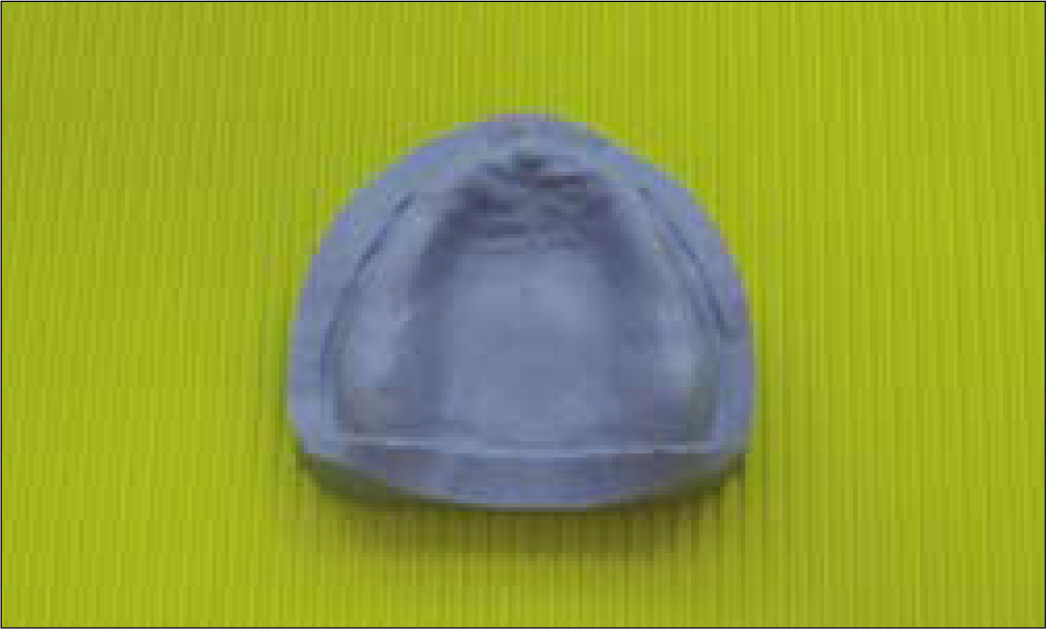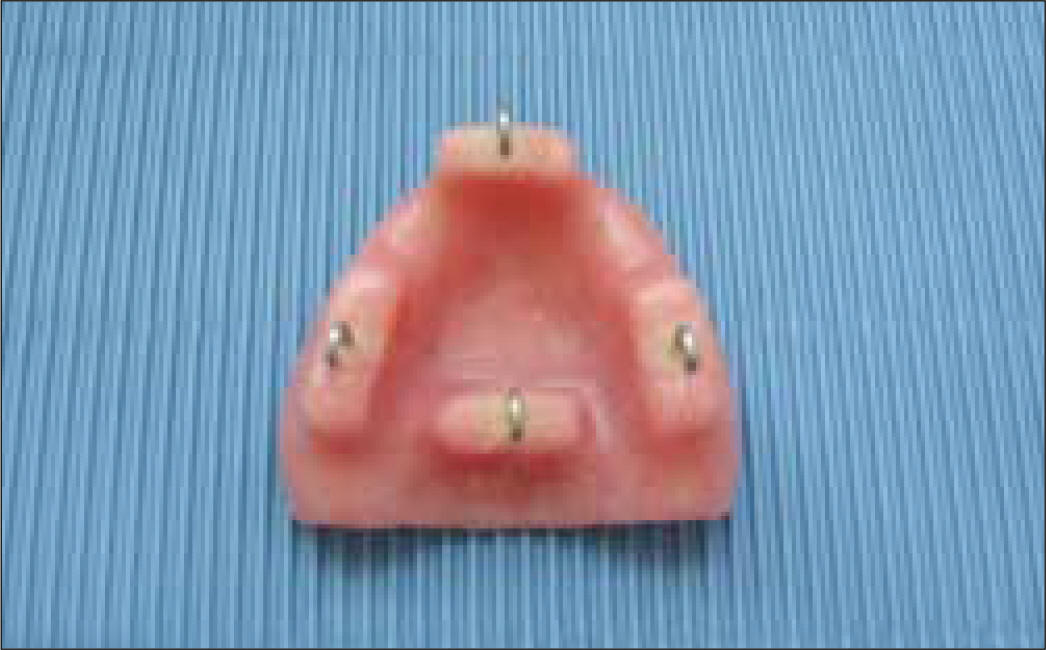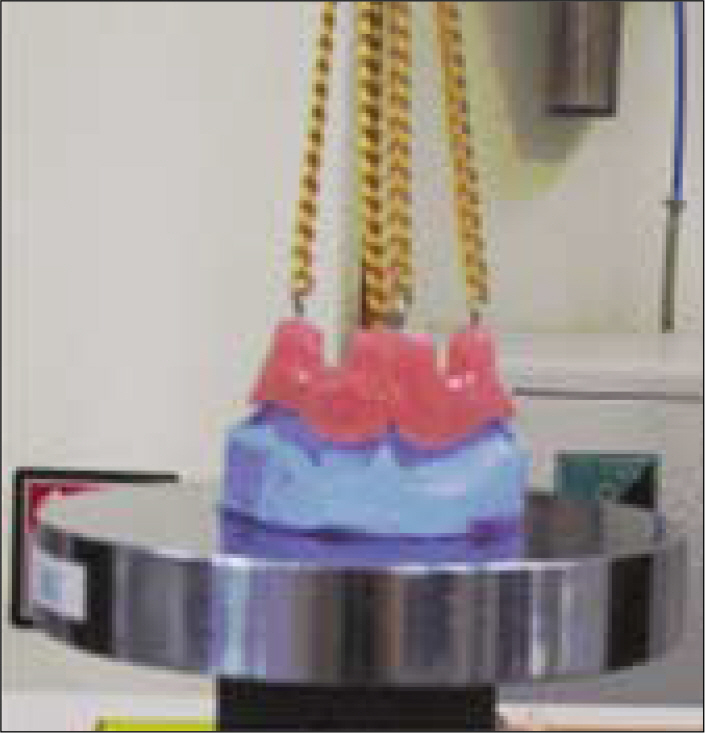J Korean Acad Prosthodont.
2010 Apr;48(2):87-93.
The effect of denture adhesives on the retention of complete denture
- Affiliations
-
- 1Department of Prosthodontics, College of Dentistry, Dankook University, Cheonan, Korea. jseok2@hanmail.net
Abstract
- PURPOSE
The purpose of this study was to compare the retention of the two denture adhesives with a silicone edentulous model and a resin denture base in vitro study. MATERIAL AND METHODS: The experimental groups were used two denture adhesives and classified into 5 subgroups each. Subgroups were divided by the number of times the saliva sprayed. The control group was used synthetic saliva only. Dislodging tensile strengths were applied to the resin denture base using Instron in 3 directions : vertical, lateral, and anterior-posterior.
RESULTS
The retention of two denture adhesives was increased significantly than saliva alone (P < .05). In each denture adhesives, the retention of saliva sprayed first was decreased than denture adhesive alone, but it didn't have significant differences. Whenever saliva sprayed repeated, the retention was decreased significantly than saliva sprayed first (P < .05). In each denture adhesives, vertical retentive force was highest than lateral and anterior-posterior retentive forces, and anterior-posterior retentive force was higher than lateral retentive force. This results were significantly different (P < .05). Significant differences of the retentive ability among two denture adhesives were not observed.
CONCLUSION
From the results, use of the denture adhesives resulted in improved retentive ability of denture. Especially retentive force was highest in vertical direction.
MeSH Terms
Figure
Reference
-
1.Grasso JE. Denture adhesives. Dent Clin North Am. 2004. 48:721–33.
Article2.Ozcan M., Kulak Y., Arikan A., Silahtar E. The attitude of complete denture wearers towards denture adhesives in Istanbul. J Oral Rehabil. 2004. 31:131–4.3.Grasso JE. Denture adhesives: changing attitudes. J Am Dent Assoc. 1996. 127:90–6.
Article4.Coates AJ. Usage of denture adhesives. J Dent. 2000. 28:137–40.
Article5.Chew CL. Retention of denture adhesives-an in vitro study. J Oral Rehabil. 1990. 17:425–34.6.Zarb GA., Bolender CL., Carlsson GE., Boucher CO. Boucher' s Prosthodontic treatment for edentulous patients. 11th ed.St. Louis: CV Mosby;1997. p. 400–11.7.Tarbet WJ., Silverman G., Schmidt NF. Maximum incisal biting force in denture wearers as influenced by adequacy of denture-bearing tissues and the use of an adhesive. J Dent Res. 1981. 60:115–9.
Article8.Tarbet WJ., Boone M., Schmidt NF. Effect of a denture adhesive on complete denture dislodgement during mastication. J Prosthet Dent. 1980. 44:374–8.
Article9.Ozcan M., Kulak Y., de Baat C., Arikan A., Ucankale M. The effect of a new denture adhesive on bite force until denture dislodgement. J Prosthodont. 2005. 14:122–6.
Article10.Kelsey CC., Lang BR., Wang RF. Examining patients' responses about the effectiveness of five denture adhesive pastes. J Am Dent Assoc. 1997. 128:1532–8.11.Uysal H., Altay OT., Alparslan N., Bilge A. Comparison of four different denture cushion adhesives-a subjective study. J Oral Rehabil. 1998. 25:209–13.12.Kapur KK. A clinical evaluation of denture adhesives. J Prosthet Dent. 1967. 18:550–8.
Article13.de Baat C., van' t Hof M., van Zeghbroeck L., Ozcan M., Kalk W. An international multicenter study on the effectiveness of a denture adhesive in maxillary dentures using disposable gnathometers. Clin Oral Investig. 2007. 11:237–43.
Article14.Zhao K., Cheng XR., Chao YL., Li ZA., Han GL. Laboratory evaluation of a new denture adhesive. Dent Mater. 2004. 20:419–24.
Article15.Panagiotouni E., Pissiotis A., Kapari D., Kaloyannides A. Retentive ability of various denture adhesive materials: an in vitro study. J Prosthet Dent. 1995. 73:578–85.16.Kulak Y., Ozcan M., Arikan A. Subjective assessment by patients of the efficiency of two denture adhesive pastes. J Prosthodont. 2005. 14:248–52.
Article17.Koppang R., Berg E., Dahm S., Real C., Fl � ystrand F. A method for testing denture adhesives. J Prosthet Dent. 1995. 73:486–91.
Article18.Grasso JE., Rendell J., Gay T. Effect of denture adhesive on the retention and stability of maxillary dentures. J Prosthet Dent. 1994. 72:399–405.19.Grasso J., Gay T., Rendell J., Baker R., Knippenberg S., Finkeldey J., Zhou X., Winston JL. Effect of denture adhesive on retention of the mandibular and maxillary dentures during function. J Clin Dent. 2000. 11:98–103.20.Rendell JK., Gay T., Grasso JE., Baker RA., Winston JL. The effect of denture adhesive on mandibular movement during chewing. J Am Dent Assoc. 2000. 131:981–6.21.Psillakis JJ., Wright RF., Grbic JT., Lamster IB. In practice evaluation of a denture adhesive using a gnathometer. J Prosthodont. 2004. 13:244–50.
Article22.Fujimori T., Hirano S., Hayakawa I. Effects of a denture adhesive on masticatory functions for complete denture wearers-consideration for the condition of denture-bearing tissues-. J Med Dent Sci. 2002. 49:151–6.23.Hasegawa S., Sekita T., Hayakawa I. Effect of denture adhesive on stability of complete dentures and the masticatory function. J Med Dent Sci. 2003. 50:239–47.
- Full Text Links
- Actions
-
Cited
- CITED
-
- Close
- Share
- Similar articles
-
- Comparative analysis of case series for the prosthetic rehabilitation of edentulous patients using suction denture
- Effects and clinical considerations of denture adhesives
- Suction-effective complete denture fabrication of edentulous patient using BPS: a case report
- A clinical study on the retention of maxillary complete denture with different denture base materials
- Evaluation of changes in adhesive strength and cytotoxicity of a denture adhesive according to time




